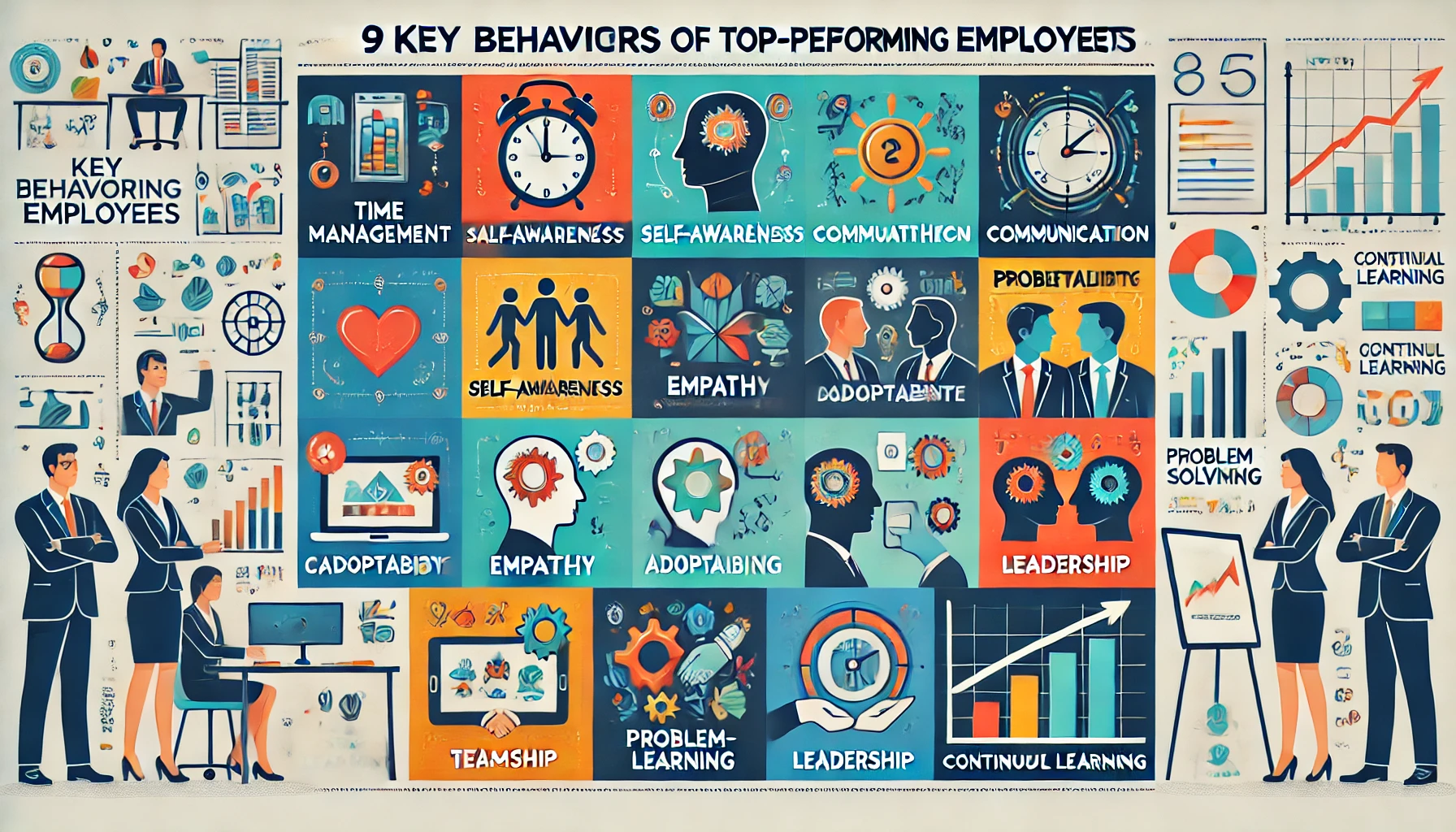Are you wondering what separates top-performing employees from the rest of the workforce? 🏆 Becoming a standout employee isn’t just about putting in more hours or following orders; it’s about developing a set of key behaviors that can dramatically increase your workplace effectiveness and success. Whether you’re aiming for a promotion, a leadership role, or simply want to excel in your current position, adopting these behaviors can make all the difference.
Let’s dive into the 9 essential behaviors of top-performing employees and explore how you can start applying them today to see real results! 🔥
1. Get Things Done (Focus on Execution) 💼
Top-performing employees don’t procrastinate—they execute! One of the primary qualities that set them apart is their ability to get things done without letting problems slow them down. Rather than complaining or dwelling on the issues, they focus on actionable solutions.
🌟 Tip: You can adopt this behavior by applying the Pareto Principle (also known as the 80/20 rule). This principle states that 80% of your results come from 20% of your efforts. Focus on high-impact tasks that generate the most significant results
How to Implement:
Prioritize urgent tasks—those that contribute the most to your team or company’s success.
Develop a problem-solving mindset. Next time an issue arises, spend less time dwelling on it and more time fixing it.
Stop multitasking. Focus on one thing at a time and complete it before moving to the next task. Your productivity will soar.
2. Be Very Self-Aware 👀
Self-awareness is a game-changer. 🧠 Top-performing employees have an excellent understanding of their strengths and weaknesses. By knowing yourself, you can maximize your strengths and improve your weaknesses—a hallmark of emotional intelligence. Emotional intelligence is the capacity to not only manage your own emotions but also to recognize and influence the emotions of others. Self-awareness helps you stay grounded, control stress, and ensure your actions are productive.
How to Implement:
Regularly evaluate your performance. After completing a task, ask yourself what went well and what could be improved.
Seek feedback from managers, peers, and mentors. Use this feedback constructively to fine-tune your strengths and improve weak areas.
Use tools like the Johari Window model to understand what others think about you, and compare it to your own perception.
📝 Remember, understanding your limits and blind spots doesn’t make you weak. It makes you strategic.
3. Show Empathy in the Workplace 💖
Empathy is not just a nice-to-have skill; it’s a necessity for top-performing employees. Whether interacting with colleagues, clients, or customers, understanding and connecting emotionally is key. Top performers excel in cognitive empathy (understanding what others think), emotional empathy (understanding what others feel), and behavioral empathy (taking action based on that understanding).
How to Implement:
In every conversation, listen actively and show that you value the other person’s viewpoint.
Practice cognitive empathy by putting yourself in others’ shoes to understand their thoughts, fears, and motivations.
Display emotional empathy by being supportive and considerate of others’ feelings, especially during stressful or difficult situations.
💡 A top tip for developing behavioral empathy: When someone shares their problem, instead of just sympathizing, offer tangible help or support.
4. Be a Strong Communicator 🗣️
Communication is at the heart of every successful relationship, be it personal or professional. Top-performing employees don’t just speak well; they communicate effectively by being clear, concise, and constructive. They are particularly skilled at giving and receiving feedback, which is crucial for team success. One method they often use is the SBI Feedback Model (Situation-Behavior-Impact):
Situation: Describe the specific situation where the issue occurred.
Behavior: Talk about the observable behavior without judgment.
Impact: Explain the impact of that behavior on you or the team.
How to Implement:
Actively listen to others before speaking. This ensures you respond thoughtfully and appropriately.
When giving feedback, stick to facts and behaviors rather than opinions or judgments.
Use visuals like charts or models when communicating complex ideas to help simplify them for others.
📢 Pro Tip: Use the SBI model to ensure feedback is always productive, even during difficult conversations.
5. Be Great at Simplifying Complex Ideas 💡
Top-performing employees have a knack for taking something complex and simplifying it for others to understand. This ability isn’t just useful for communication—it also enhances problem-solving. By simplifying issues, top performers can tackle even the most daunting tasks efficiently. One of the best ways to develop this skill is through the Feynman Technique, named after the physicist Richard Feynman.
How to Implement:
Break down complex ideas into smaller, more digestible parts.
Try explaining a complicated topic to someone with no background knowledge of the subject. If you can simplify it for them, you’ve mastered it yourself.
Draw from examples, stories, or analogies to make abstract concepts more relatable.
🎓 With practice, simplifying complexity becomes second nature—helping you become an indispensable team player.
6. Have Control Over Your Emotions 😌
Emotion regulation is a vital skill that top-performing employees possess. They manage stress effectively, stay calm under pressure, and never allow emotions to cloud their decision-making. These employees also leverage emotional intelligence to ensure that emotions are used to drive positive outcomes instead of negative ones.
How to Implement:
When you feel stressed, take a moment to pause and breathe. Deep breathing exercises can help you regain control over your emotions.
Learn to compartmentalize emotions—separating your personal emotions from your work tasks allows you to stay focused.
Practice self-regulation techniques like journaling, meditation, or mindfulness to keep your emotions in check.
🚀 A top-performing employee doesn’t let emotions control them—they control their emotions!
7. Speak Up Regularly 🎤
Top-performing employees know the value of speaking up. They voice their concerns, suggestions, and ideas in meetings and group discussions. Not only do they contribute positively to team dynamics, but they also advocate for both themselves and others when needed.
How to Implement:
If you have an idea or observation, don’t hesitate to share it.
Build your confidence by starting with small contributions in meetings and gradually working your way up to more significant discussions.
Don’t be afraid to challenge the status quo—innovation often comes from those who dare to question the norm.
✨ Speaking up is not just about being heard—it’s about driving positive change within your team and organization.
8. Manage Your Time Well ⏳
Time management is a crucial skill that all top-performing employees possess. These individuals are highly organized and have a system for prioritizing tasks. One tool that can help you become a master of time management is the Eisenhower Matrix, which helps differentiate between tasks that are urgent and important, and those that are neither.
🗂 Using the Eisenhower Matrix:
Do It: Focus on urgent and important tasks first.
Schedule It: Decide when you will handle important but not urgent tasks.
Delegate It: Find someone else to handle urgent but less important tasks.
Eliminate It: Get rid of tasks that are neither urgent nor important.
How to Implement:
Start your day by identifying your most important tasks (MITs) and tackling them first.
Block out time for deep work, free from distractions, so you can focus on your most critical tasks.
Delegate where possible to free up time for tasks that truly require your attention.
⌛ Efficient time management allows top-performing employees to achieve more without burning out. It’s about working smarter, not harder.
9. Enjoy Being Wrong 🌱
Embracing mistakes is part of the journey toward growth and excellence. Top-performing employees don’t fear failure—they welcome it as an opportunity to learn and improve. This behavior is linked to cultivating a growth mindset, which helps employees see challenges as opportunities rather than threats.
How to Implement:
When you make a mistake, instead of getting defensive, own it and focus on what you can learn from the experience.
Ask for feedback on how you can improve after each project or task.
Stay open to new ideas and perspectives. Sometimes, what feels like a mistake is just a stepping stone toward a better solution.
💡 Embracing failure helps you grow, innovate, and ultimately become more resilient.
Conclusion: 9 Key Behaviors of Top-Performing Employees and How to Cultivate Them
Becoming a top-performing employee isn’t about being perfect; it’s about continuous improvement, adopting key behaviors, and having the right mindset. From managing your time effectively to showing empathy, these habits are crucial for anyone looking to enhance their workplace performance and career prospects. 🌟 Start by focusing on one or two areas where you can improve, and gradually build these behaviors into your daily work routine. Success awaits! 🚀
























